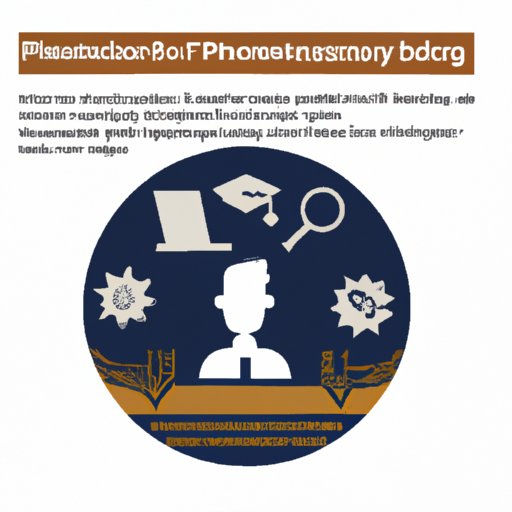Introduction
A doctorate degree in computer science is a prestigious accomplishment that can open up many job opportunities and provide a higher salary. The process of obtaining a PhD in computer science can seem daunting and overwhelming, but with the right preparation, research, and guidance, anyone can earn a PhD in this field. This article will provide an overview of what it takes to get a PhD in computer science, from researching programs and requirements to finding ways to fund your education.
Research Programs and Requirements
Before applying to a program, you should do research to make sure you understand the degree requirements and what is expected of you as a student. Generally, most doctoral programs in computer science involve completing coursework, passing qualifying exams, and conducting research to write and defend a dissertation.
Coursework Requirements
Most universities require students to take a certain number of courses in order to meet their degree requirements, which are typically related to the student’s area of research. Courses may include topics such as algorithms, programming languages, data structures, operating systems, software engineering, and artificial intelligence.
Research Components
In addition to coursework, most PhD programs in computer science require students to conduct independent research and write a dissertation. According to a study published in the Journal of Higher Education Policy and Management, “The research component of a PhD program is designed to develop a student’s ability to conduct independent research and demonstrate expertise in their chosen field.”
Choose an Advisor and Program
When selecting a program and advisor, it is important to identify potential advisors who share similar research interests to ensure that your research project aligns with your goals and interests. You should also make sure that the program you choose is accredited and has a good reputation.
Identifying Potential Advisors
One of the best ways to find potential advisors is to look at faculty members at universities who specialize in your area of interest. You can also attend conferences or seminars to network with other researchers in your field and learn more about potential advisors.
Aligning with Research Interests
Once you have identified potential advisors, you should reach out to them and discuss your research interests. It is important to make sure that your research interests align with those of the potential advisor in order to ensure a successful relationship.
Apply to the Program
Once you have identified a program and advisor, the next step is to apply to the program. Most universities require applicants to submit a variety of materials, including transcripts, letters of recommendation, and personal statements.
Required Application Materials
Most universities require applicants to submit official transcripts, letters of recommendation, and a personal statement. Applicants should also provide proof of English proficiency if they are not native English speakers.
Transcripts
Applicants must submit official transcripts from all undergraduate and graduate institutions attended. Transcripts should be sent directly from the institution to the university.
Letters of Recommendation
Letters of recommendation should come from professors or supervisors who can speak to the applicant’s qualifications and potential for success in a doctoral program. Letters should be written in a professional manner and address the applicant’s academic and research abilities.
Personal Statements
Personal statements should provide a clear picture of the applicant’s qualifications, research interests, and career goals. Personal statements should be concise, well-written, and free of errors.
Fund Your Education
When pursuing a PhD in computer science, it is important to have a plan for financing your education. There are several options available, including scholarships, grants, and fellowships.
Scholarships
Many universities offer scholarships to students pursuing a PhD in computer science. Scholarships may be merit-based or need-based and may cover some or all of the tuition costs.
Grants
Grants are available from both private and public sources and can be used to cover tuition costs, living expenses, and research costs. Grants are often awarded based on merit and may require recipients to complete certain tasks or activities.
Fellowships
Fellowships are similar to grants and may be available from universities or private organizations. Fellowships may be awarded based on merit and may require recipients to complete certain tasks or activities.
Work on Your Dissertation
Once you have been accepted into a doctoral program and have secured funding, the next step is to begin work on your dissertation. This involves developing a dissertation project, completing the project, and receiving guidance from your advisor.
Developing a Dissertation Project
The first step in writing a dissertation is to develop a research project. This involves identifying a research problem, formulating a research question, and creating a research plan. Students should consult with their advisor throughout the process.
Completing the Project
Once the research project is developed, students should begin collecting and analyzing data. This process may involve conducting interviews, surveys, or experiments. Once the data is collected and analyzed, students should write up the results of the research in a dissertation.
Guidance from Advisor
Throughout the entire process, students should receive guidance from their advisor. Advisors can provide feedback on the research project, review drafts of the dissertation, and provide advice on how to improve the dissertation.
Conclusion
Obtaining a PhD in computer science is a lengthy and challenging process, but it is possible with the right preparation, research, and guidance. The process includes researching programs and requirements, choosing an advisor and program, applying to the program, funding your education, and working on your dissertation. With the right support and dedication, anyone can obtain a PhD in computer science.
(Note: Is this article not meeting your expectations? Do you have knowledge or insights to share? Unlock new opportunities and expand your reach by joining our authors team. Click Registration to join us and share your expertise with our readers.)
